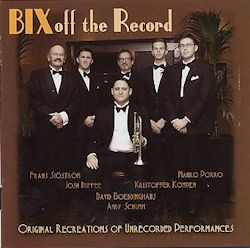1. Wolverine Blues
2. Driftwood
3. Lazy River
4. You Are Just a Vision
5. Dinah
6. Swanee
7. Stardust
8. I’d Climb The Highest Mountain
9. Skylark
10. O Katharina!
11. That’s The Good Old Sunny South
12. Angry
13. No One Knows What It’s All About
14. Hawaiian Butterfly
15. Mean To Me
Andy Schumm – Cornet
Kristoffer Kompen – Trombone
Mauro Porro – Clarinet, alto saxophone
David Boeddinghaus – Piano
Frans Sjöström – Bass saxophone
Josh Duffee – Drums
Recorded The Customs House, South Shields, England, Nov. 10, 2014
Among the many unrecorded early jazz and ragtime performers, two of the most celebrated are Scott Joplin and Buddy Bolden. While Joplin’s playing was
preserved on several piano rolls in 1916, these were edited so we can’t be sure of what Joplin actually played. A number of piano players, Knocky Parker
being one, have also tried to recreate his playing in recordings of his compositions. As for Bolden, there is the legend of a wax cylinder recording of his
band, but it has not been unearthed to this day. Based on the statements of musicians who played with—or at least heard—Bolden, Humphrey Lyttelton, for
one, tried to recreate what Bolden must have sounded like in a double LP titled Gonna Call My Children Home: The World of Buddy Bolden.
No such problem exists with Bix Beiderbecke; since a good number of recordings he made are still available, we know what he sounded like. Not
available, of course, are numbers he did not record, and this CD attempts to supply that deficiency by recreating performances of some of the
tunes in his repertoire he did not record (or at least were unissued), as the title indicates, and some he well may have played. While many cornetists,
such as Johnny Wiggs and Jimmy McPartland, were influenced by Beiderbecke, others, such as Richard Sudhalter and Tom Pletcher, have attempted to copy the
style and tone of Beiderbecke. None, however, has captured the sound and the style—indeed the spirit—of Bix better than Andy Schumm does in this session.
The group here follows the instrumentation of Bix and His Gang—cornet, clarinet, trombone, piano, bass sax, drums. Half of the band is European—from
Norway, Sweden, and Italy—the rest from the U.S., but all blend together well, being intimately acquainted with Bix. Of the U.S. contingent, Duffee on
drums has impressive credentials, being a board member of the Bix Beiderbecke Memorial Society as well as living in Davenport,. Iowa, and leading a vintage
big band. Boeddinghaus, formerly of New York, now of Louisiana, is a well-known pianist in vintage jazz circles. Schumm is a 20s jazz specialist,
particularly in Beiderbecke. The results of his passion for Bix are manifest in this CD as he gets a fairly close approximation of Bix’s tone, nicely
executes the half-valve work, and captures the kind of breaks that Bix favored, each seeming to leap out of the speakers affirmatively.
Quite a few tunes on the list will be less-than-familiar to most, I would imagine, and that is not a bad thing. I was a bit surprised to see Hoagy
Carmichael’s Skylark in there as it is of later vintage than the others on the list. Hoagy and Bix were close friends and did play together on at
least one occasion, and of course Carmichael’s Stardust is included on this CD. However, the CD insert tells that while Skylark was
published in 1941 (some ten years after Bix’s demise), it was actually composed several years earlier (its original title to have been Bix Licks)
for a musical about Bix. Having obtained the arrangement presented here from Swedish jazz cornetist Bent Persson, the group thought it fitting to include
in the program.
From the lively full-group rendition of Wolverine Blues that opens the recording to the passionate piano/cornet duet on Mean to Me (which
perhaps gives us a sense of what Bix might have produced had overdubbing been more available in his time) that closes it, this CD will delight Bix fans or
those who are partial to 20s jazz. I should also add that the controlling idea of having the tune list comprise unrecorded numbers that Bix did
play or might have played was a sound one. Why bother to copy and record tunes that were recorded by Bix himself and were issued at the time, when these
original recordings are still available? There would be little originality there; but here we have something that is unique. Two thumbs up.
Bert Thompson
